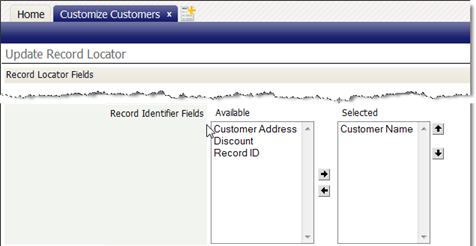Difference between revisions of "Record Identifier"
imported>Aeric |
imported>Aeric |
||
| (10 intermediate revisions by the same user not shown) | |||
| Line 1: | Line 1: | ||
''' | '''[[File:GearIcon.png]] > Customization > Objects > {object} > [Record Locators] > Record Identifier Fields''' | ||
A ''Record Identifier'' consists of one or more fields that are displayed when a record has been | A ''Record Identifier'' (also known as a "record name") consists of one or more fields that are displayed when a record has been selected. (When multiple fields are specified, their values are separated by hyphens and displayed as the value of a [[Lookup]] field.) | ||
====About Record Identifiers==== | ====About Record Identifiers==== | ||
Ideally, a Record Identifier unique label that distinguishes one record from another (although it need not be). These labels can be seen in [[Views]] and [[Records]]. | Ideally, a Record Identifier unique label that distinguishes one record from another (although it need not be). These labels can be seen in [[Views]] and [[Records]]. | ||
:When a new object is created, the first three fields defined in the object are used to form the default Record Identifier. The Record Identifier can be changed at any time. | |||
{{Tip| | |||
:When a new object is created, the first three fields defined in the object are used to form the default Record Identifier. The Record Identifier can be changed at any time. | *To ensure that the record identifier is unique, use it to define a [[Unique Key Index]]. | ||
*Modifying fields that form the record locator for an object using '''Business Rule''' actions is NOT recommended. This modification can cause the subsequent actions in rule sets to fail.}} | |||
==== Example ==== | ==== Example ==== | ||
In this example, the Customer object specifies the <tt>customer_name</tt> field | In this example, the Customer object specifies the <tt>customer_name</tt> field as the Record Identifier. When the customer has been selected in a [[Lookup]], the <tt>customer_name</tt> field is displayed to indicate which record was chosen. | ||
:[[File:RecordIdentifierFields.png]] | :[[File:RecordIdentifierFields.png]] | ||
| Line 17: | Line 18: | ||
==== Eligible Record Identifier Fields ==== | ==== Eligible Record Identifier Fields ==== | ||
In general, fields that are available for use as record identifiers resolve to a single alphanumeric value of moderate size. | In general, fields that are available for use as record identifiers resolve to a single alphanumeric value of moderate size. | ||
When you use [[Enumerated Fields]] as Record Identifier, the values are displayed and not the labels. | |||
One [[Lookup]] field may be specified. | One [[Lookup]] field may be specified. | ||
Latest revision as of 04:54, 7 October 2021
![]() > Customization > Objects > {object} > [Record Locators] > Record Identifier Fields
> Customization > Objects > {object} > [Record Locators] > Record Identifier Fields
A Record Identifier (also known as a "record name") consists of one or more fields that are displayed when a record has been selected. (When multiple fields are specified, their values are separated by hyphens and displayed as the value of a Lookup field.)
About Record Identifiers
Ideally, a Record Identifier unique label that distinguishes one record from another (although it need not be). These labels can be seen in Views and Records.
- When a new object is created, the first three fields defined in the object are used to form the default Record Identifier. The Record Identifier can be changed at any time.
Tip:
- To ensure that the record identifier is unique, use it to define a Unique Key Index.
- Modifying fields that form the record locator for an object using Business Rule actions is NOT recommended. This modification can cause the subsequent actions in rule sets to fail.
Example
In this example, the Customer object specifies the customer_name field as the Record Identifier. When the customer has been selected in a Lookup, the customer_name field is displayed to indicate which record was chosen.
Eligible Record Identifier Fields
In general, fields that are available for use as record identifiers resolve to a single alphanumeric value of moderate size. When you use Enumerated Fields as Record Identifier, the values are displayed and not the labels.
One Lookup field may be specified.
These fields cannot be used:
- File
- Image
- Text Area
- Custom Control
- Url
- Rich Text Area
